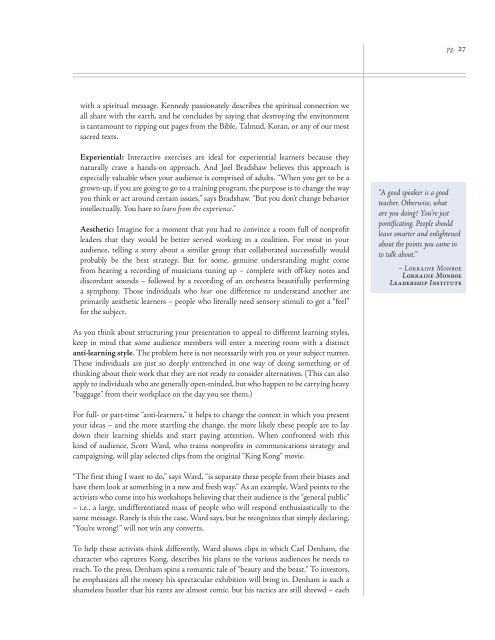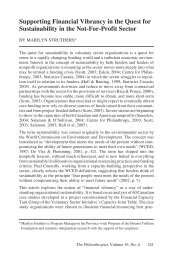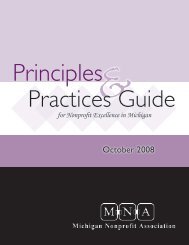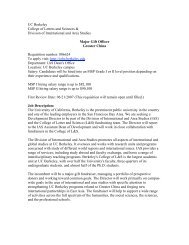Why Bad Presentations Happen to Good Causes - The Goodman ...
Why Bad Presentations Happen to Good Causes - The Goodman ...
Why Bad Presentations Happen to Good Causes - The Goodman ...
Create successful ePaper yourself
Turn your PDF publications into a flip-book with our unique Google optimized e-Paper software.
with a spiritual message. Kennedy passionately describes the spiritual connection we<br />
all share with the earth, and he concludes by saying that destroying the environment<br />
is tantamount <strong>to</strong> ripping out pages from the Bible, Talmud, Koran, or any of our most<br />
sacred texts.<br />
Experiential: Interactive exercises are ideal for experiential learners because they<br />
naturally crave a hands-on approach. And Joel Bradshaw believes this approach is<br />
especially valuable when your audience is comprised of adults. “When you get <strong>to</strong> be a<br />
grown-up, if you are going <strong>to</strong> go <strong>to</strong> a training program, the purpose is <strong>to</strong> change the way<br />
you think or act around certain issues,” says Bradshaw. “But you don’t change behavior<br />
intellectually. You have <strong>to</strong> learn from the experience.”<br />
Aesthetic: Imagine for a moment that you had <strong>to</strong> convince a room full of nonprofit<br />
leaders that they would be better served working in a coalition. For most in your<br />
audience, telling a s<strong>to</strong>ry about a similar group that collaborated successfully would<br />
probably be the best strategy. But for some, genuine understanding might come<br />
from hearing a recording of musicians tuning up – complete with off-key notes and<br />
discordant sounds – followed by a recording of an orchestra beautifully performing<br />
a symphony. Those individuals who hear one difference <strong>to</strong> understand another are<br />
primarily aesthetic learners – people who literally need sensory stimuli <strong>to</strong> get a “feel”<br />
for the subject.<br />
As you think about structuring your presentation <strong>to</strong> appeal <strong>to</strong> different learning styles,<br />
keep in mind that some audience members will enter a meeting room with a distinct<br />
anti-learning style. <strong>The</strong> problem here is not necessarily with you or your subject matter.<br />
<strong>The</strong>se individuals are just so deeply entrenched in one way of doing something or of<br />
thinking about their work that they are not ready <strong>to</strong> consider alternatives. (This can also<br />
apply <strong>to</strong> individuals who are generally open-minded, but who happen <strong>to</strong> be carrying heavy<br />
“baggage” from their workplace on the day you see them.)<br />
For full- or part-time “anti-learners,” it helps <strong>to</strong> change the context in which you present<br />
your ideas – and the more startling the change, the more likely these people are <strong>to</strong> lay<br />
down their learning shields and start paying attention. When confronted with this<br />
kind of audience, Scott Ward, who trains nonprofits in communications strategy and<br />
campaigning, will play selected clips from the original “King Kong” movie.<br />
“<strong>The</strong> first thing I want <strong>to</strong> do,” says Ward, “is separate these people from their biases and<br />
have them look at something in a new and fresh way.” As an example, Ward points <strong>to</strong> the<br />
activists who come in<strong>to</strong> his workshops believing that their audience is the “general public”<br />
– i.e., a large, undifferentiated mass of people who will respond enthusiastically <strong>to</strong> the<br />
same message. Rarely is this the case, Ward says, but he recognizes that simply declaring,<br />
“You’re wrong!” will not win any converts.<br />
To help these activists think differently, Ward shows clips in which Carl Denham, the<br />
character who captures Kong, describes his plans <strong>to</strong> the various audiences he needs <strong>to</strong><br />
reach. To the press, Denham spins a romantic tale of “beauty and the beast.” To inves<strong>to</strong>rs,<br />
he emphasizes all the money his spectacular exhibition will bring in. Denham is such a<br />
shameless hustler that his rants are almost comic, but his tactics are still shrewd – each<br />
pg. 27<br />
“A good speaker is a good<br />
teacher. Otherwise, what<br />
are you doing? You’re just<br />
pontificating. People should<br />
leave smarter and enlightened<br />
about the points you came in<br />
<strong>to</strong> talk about.”<br />
– Lorraine Monroe<br />
Lorraine Monroe<br />
Leadership Institute













